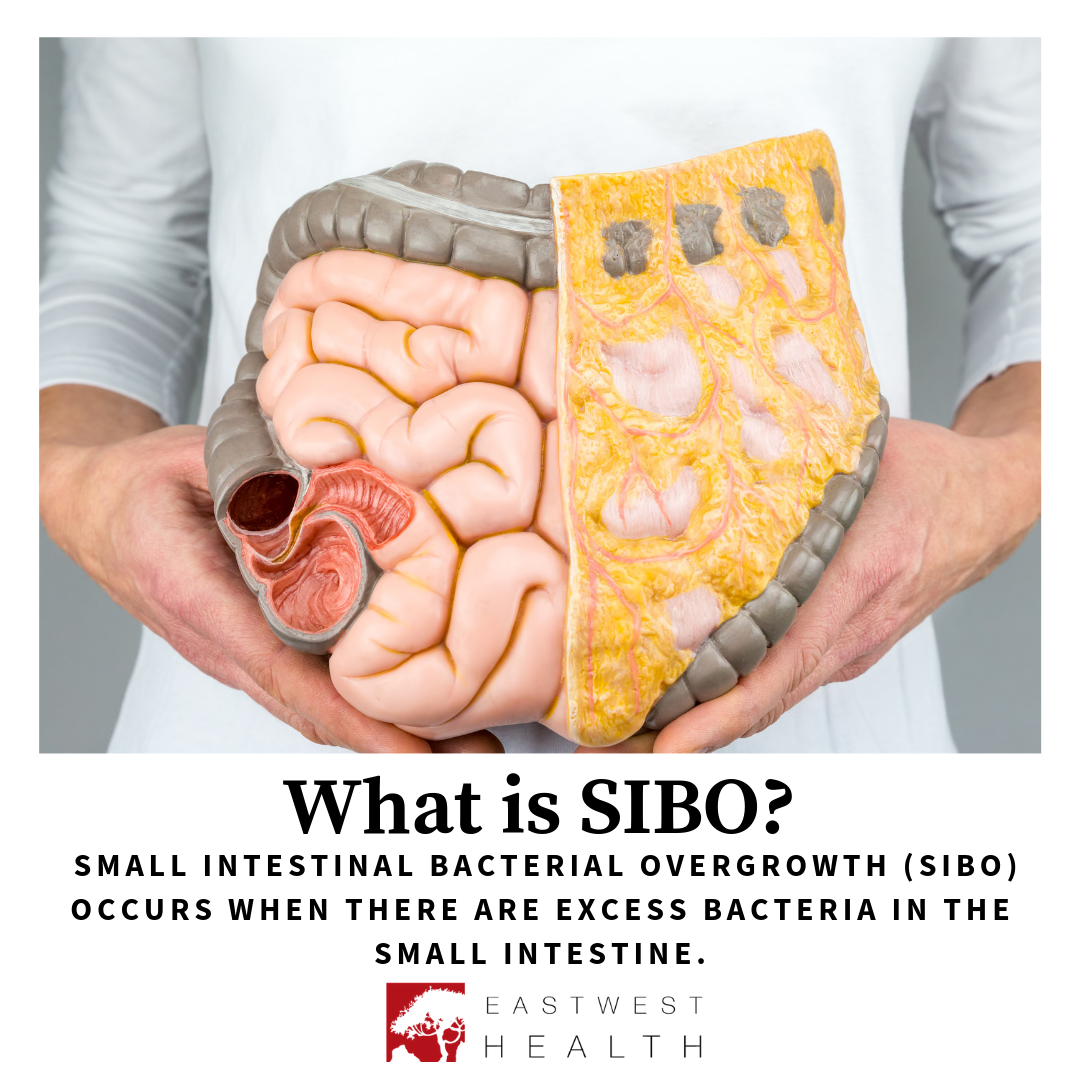
In a recent Wellness Webinar, Regan dove deeper into Small Intestine Bacterial Overgrowth (SIBO), its causes, and what we can do to solve it and start living a healthier and happier life.
East West Health had a patient that had been coming to them for a while. He had horrible allergies. Even the snow brought out his allergies.
He had brain fog, cramps in his stomach and was not feeling like himself. Once they figured out he was suffering from SIBO, he was able to get relief. He had more energy and was more focused while at work.
SIBO is a newer phenomenon and discovery. It was first introduced in 2014 and people are learning more and more about it each year.
The root cause of most of the issues that we are experiencing all start in the gut. If your gut is not healthy, you will most likely feel that in other places in your body.
How Does SIBO Work?
The stomach is like the oven–it cooks the food and then the food is digested and exits into the small intestine. Then, there are enzymes to break down food and the small intestine is the major place where you absorb nutrients. In your small intestine, there is an intestinal barrier which is s single cell layer thick.
This barrier allows passage of essential nutrients and minerals and when it is functioning properly, it only allows certain molecules and minerals to pass through.
If there is inflammation in the small intestine, from medications, for example, the tight junctions open up and undigested food leaks through into the small intestine.
The unwanted food, molecules, etc that pass through causing your body to freak out. You may get a stomach ache, brain fog, low libido, or achy joints. This is all due to the leakage of food into your small intestine.
Once your food hits the large intestine, it hits the second stage of fermentation. That fermentation is where fibers get digested by bacterias.
Plantains and sweet potatoes are great resistant starches that bacteria love. Food sits and ferments in your large intestine and hydrates the body during that process.
The fecal matter is then released from the large intestine. A well-formed stool is an indication that your systems are working well. The fecal matter is what makes your stool dense.
When your bacteria flora gets out of balance, you have certain species that are invasive or not friendly to you and they can infiltrate bacteria where you don’t want it–specifically your small intestine.
Many people have this occur because they don’t chew their food properly or because they don’t relax when they eat.
4 Causes of Leaky Gut
There are many causes that can contribute to a leaky gut. They are:
Food- gluten, dairy, other toxic, and inflammatory foods( soy, corn, peanuts,)
Gut Infections- candida overgrowth, parasites, SIBO, toxins from medications,
Toxins- medications, mercury, pesticides, BPA, 10 ten most popular drugs can threaten our digestive system.
Stress- chronic emotion and physical stress
Stress is the number one cause of leaky gut.
SIBO Condition
The ten most common symptoms of SIBO are the following: (percentages represent the people who have SIBO and have experienced that specific symptom)
Bloating /gas 76%
Tire easy/ weakness 65%
Anxiety 50%
Sleeplessness 44%
Constipation 42%
Food Intolerance 42%
Irregular Bowel Movements 37%
Weight Loss/weight gain 36%
Joint Pain 34%
SIBO is diagnosed using a breath test. If you experience any of these symptoms, the root cause could be SIBO.
If you are suffering from these symptoms, stop by of our clinics and get tested so you can start feeling better.
What Causes SIBO?
Traumatic brain injury is one of the biggest causes of SIBO. The vagus nerve, or the wandering nerve, is the longest nerve next to the sciatic nerve.
This nerve connects the digestive functions to your brain. If the nerve gets pinched or damaged, there is a decrease in the digestive enzymes.
There are certain medications that can contribute to SIB) as well as a nutritional deficiency, hormonal imbalance, or a diet that is high in carbs or complex sugars. SIBO can also contribute to autoimmunity.
If you have one autoimmune disease, you have three times the chance of getting other autoimmune diseases. People often times associate autoimmune disease with genes, but it actually starts in the gut and then the bacteria influences the genes.
What can you do to fix SIBO?
One of the biggest things you can do to fix SIBO is to avoid certain foods.
Here is a list of certain foods you should avoid: Garlic, onions, artichokes, cauliflower, peas, potatoes, yams, cabbage, asparagus, proteins with flours, apples, apricots, cherries, blackberries, dates, dried fruits, fruit juices, mangoes, plums, watermelon, canola oil, soybean oil, pistachios, cashews and more.
Surprisingly, there are a lot more foods that can negatively affect you if you are already suffering from SIBO.
Luckily, there are other great food options for you to enjoy if you are struggling with SIBO.
They include bamboo shoots, carrots, lettuce, kale, cucumbers, zucchini, bananas, cherry tomatoes, raspberry, tangelos, almonds, brazil nuts, almond oil, avocado oil.
If you feel like you may be suffering from SIBO, give us a call or stop by a clinic today!
Get tested and know how to feel better and living the life you love.